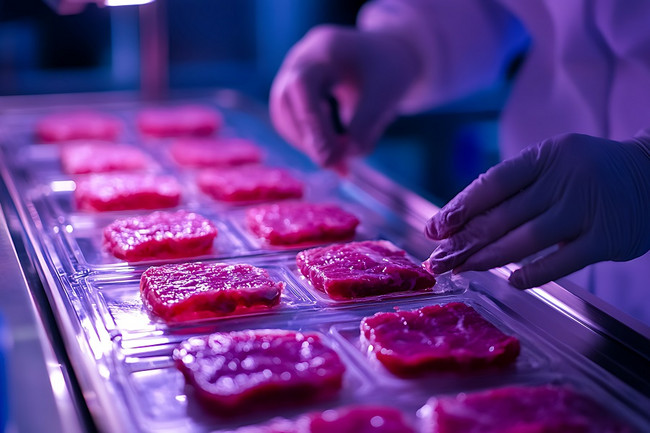✕



✕

Tag:cellular agriculture Netherlands 2025-01-17 11:27

The Netherlands is investing in cellular agriculture by establishing two new facilities to help food companies scale cell culture and precision fermentation. These open-access plants will enable F&B players in the sector to enhance R&D capabilities without spending on costly, pilot-scale production infrastructure.
“By 2025, we anticipate more companies submitting regulatory approval dossiers and moving closer to cost-effective production. Offering open-access upscaling facilities will allow companies to progress faster and more cost-efficiently by not having to invest in pilot facilities themselves,” Marcel Oogink, MD of one of the facilities, Biotechnology Fermentation Factory (BFF), tells Food Ingredients First.
The BFF will focus on precision fermentation, while the other, an independent spin-out of Dutch food tech company Mosa Meat, will work on cell culture bioprocesses.
The sites, located in the cities of Ede and Maastricht, are the result of a collaboration between the Cellular Agriculture Netherlands Foundation (CAN), BFF, NIZO Food Research, Cultivate at Scale, Mosa Meat, the Ministry of Agriculture, Fisheries, Food Security and Nature and the Dutch government’s National Growth Fund.
The stakeholders involved aim to bring industry leaders, research organizations and the Dutch government together to support the growth of the emerging cellular agriculture industry.
Maresa Oosterman, chair of the CAN, says: “After years of preparations, we’re now thrilled to announce these scale-up facilities, which are crucial for advancing cellular agriculture in the Netherlands and globally. In the past years, we have enabled cellular agriculture research programs at universities and educational programs to train a workforce.”
“This scale-up collaboration is another powerful example of how we drive innovation in food production. We can diversify our protein sources by scaling up precision fermentation and cell culture and future-proof our food systems.”
Scaling precision fermentation
Cellular agriculture is touted as a sustainable alternative to conventional food production as it can significantly reduce the environmental impact of industrialization while improving food security and health.
The BFF will be a precision fermentation-focused site, directly connecting with NIZO’s existing food-grade downstream processing plant and application research.
“This connection allows companies and organizations not only to develop and scale up their products but also to accelerate the entire process — from initial ingredient production to testing for taste, texture, food safety, and application in real food products,” explains Oogink.
“What makes it different is the capability to scale aerobic fermentation processes, including work with genetically modified microorganisms (GMMOs), up to 10,000L.”
The project is supported by a €12.5 million (US$12.8 million ) grant from the Dutch government. The company will further provide €5 million (US$5.1 million) through kind co-financing. Construction is underway, with full completion expected by 2027.
“A lot of research in the project is being performed to improve technologies and upscaling to make these products remain affordable and accessible to mainstream consumers,” Oognik tells us.
“NIZO will continue to set up pre-competitive research consortium projects with industrial and knowledge partners to make further advancements and create practical solutions for sustainable, affordable, safe, tasty and healthy Novel Foods.”
Oognik points out that certain emerging trends are already shaping the next phase of cell-based product development.
“Integrating AI and data-driven approaches are improving process efficiencies and reducing development timelines. There is a focus on hybrid products: combining plant-based ingredients with cell-based components to create cost-effective and scalable solutions.”
[Another trend is] scientific-based and statistical sensory evaluation via approved tastings to support research and product development with novel ingredients. NIZO has an export sensory panel that can be trained to support already established tastings in cell cultivated products in the Netherlands, with an outlook to establish such tastings for precision fermented products as well.”
Cell culture advances
The Maastricht site, Cultivate at Scale, is open-access and fully operational. It is equipped with supplies of cell feed, cell lines and bioreactors. The company notes that the production environment has upgraded quality control processes, which has enabled multiple Novel Foods submission dossiers in the past.
“This initiative, made possible by the financial support of the Dutch government, Mosa Meat’s expertise in cultivated meat production and the collaboration of partners across the cellular agriculture ecosystem, represents a major step forward for our industry.”
“We look forward to helping companies bridge the gap from research to scalable production, accelerating the global transition to sustainable and innovative food systems,” says Jaco van der Merwe, MD of Cultivate at Scale.
We Tried 12 Burgers At Burger King And This Was Hands-Down The Best One
The Storing Mistake You're Making With Jarred Garlic
The Extra Step That Will Take Your Bologna Sandwich To A New Level
The Cutting Mistake That's Destroying Your Rump Roast's Tenderness
About Us Terms of Service Privacy Policy Contact Us
Hotline(+86)17301604571
 Enterprise WeChat
Enterprise WeChat
for Client Service
 EZBuy
EZBuy
WeChat APP
Sinoexpo Digital Platform
Shanghai Sinoexpo Informa Markets International Exhibition Co., Ltd. All rights reserved
沪ICP备05034851号-77
 沪公网安备31010402000543号
沪公网安备31010402000543号